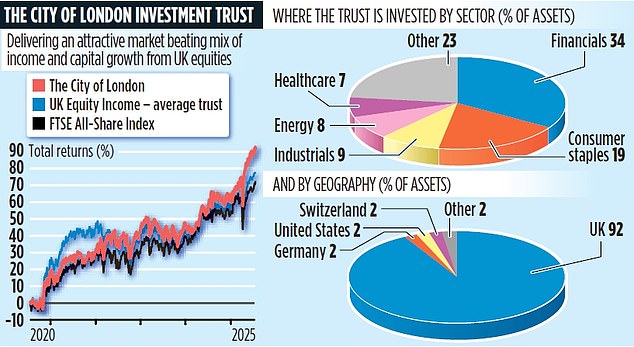[ad_1]
Like the UK stock market, investment trust City of London is on something of a roll, much to the delight of its shareholders.
Despite its inherent investment conservatism, the £2.5 billion fund continues to outperform its benchmark, the FTSE All-Share Index.
Over the last year, it has delivered a total return, comprising a mix of income and share price gain, of 22.4 per cent, comfortably beating the 15.3 per cent return generated by the FTSE All-Share Index. It has also beaten its benchmark over the past three and five years.
The trust’s focus on income from a portfolio of UK shares makes it a popular choice among retail investors. When the final quarterly dividend for the financial year just gone is paid at the end of next month, the FTSE 250-listed trust will have racked up 59 consecutive years of income increases.
No other investment trust has such a long-standing record, although nine others have grown their income for at least half a century.
In pounds and pence, the trust’s income payments in the last financial year tot up to 21.3p a share, 3.4 per cent ahead of the previous year and equivalent to an annual dividend yield in excess of four per cent.

To put these payments into context, the shares now stand at just below £5, although last week they briefly breached £5 for the first time in the trust’s 134-year history.
For the past 34 years, City of London – one of 11 from the Janus Henderson stable of investment trusts – has been managed by Job Curtis with David Smith jumping on board four years ago as his deputy.
Understandably, Curtis is proud of the trust’s record and the conservative slant of the 79-strong portfolio. This conservatism comes through in many ways.
For a start, most of the holdings are cash generative businesses with a propensity to pay a growing dividend.

Also, most – 80 per cent plus – are FTSE 100 listed companies with businesses that span the globe. Some 60 per cent of the revenues that the trust’s holdings earn are overseas.
Although the FTSE 100 surpassed 9,000 in recent days, Curtis believes there is more to come. He says: ‘The UK stock market still provides excellent value compared to other global markets. In effect, like the trust, it provides investors with the opportunity to get exposure to some attractive global companies at a discount.’
In the past year and a half, Curtis has increased the trust’s holdings in UK-listed banks: HSBC, NatWest and Lloyds are all among the fund’s top ten positions. It has proved a profitable decision, and he believes there are more gains and dividends up for grabs.
‘A big change, prompted by government, is taking place in the regulation of UK banks,’ he says. ‘The emphasis is now less on whether the banks are sufficiently capitalised, and more on enabling them to increase their lending, fuel economic growth, improve profits and deliver dividend growth.’
Other attractive features of this trust include low annual charges, totalling 0.37 per cent. To put this figure into perspective, the average for the UK equity income sector is 0.56 per cent. The fees (in percentage terms) will reduce when the trust grows to £3 billion.
Also, the shares currently trade at a small premium to the underlying assets, unlike many rivals. Curtis says: ‘The trust’s board takes the view that investors value stability. This means shares will be bought back if they trade at a discount above 2 per cent.’
The trust’s stock market ticker is CTY and identification code 0199049.
DIY INVESTING PLATFORMS

AJ Bell

AJ Bell
Easy investing and ready-made portfolios

Hargreaves Lansdown

Hargreaves Lansdown
Free fund dealing and investment ideas

interactive investor

interactive investor
Flat-fee investing from £4.99 per month

InvestEngine

InvestEngine
Account and trading fee-free ETF investing
Trading 212
Trading 212
Free share dealing and no account fee
Affiliate links: If you take out a product This is Money may earn a commission. These deals are chosen by our editorial team, as we think they are worth highlighting. This does not affect our editorial independence.
[ad_2]
This article was originally published by a www.dailymail.co.uk . Read the Original article here. .

